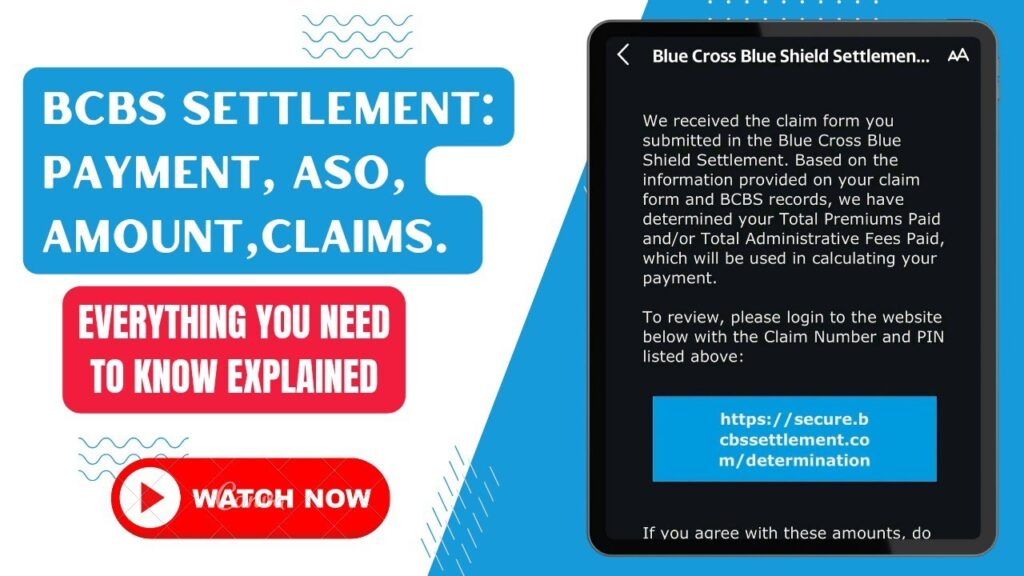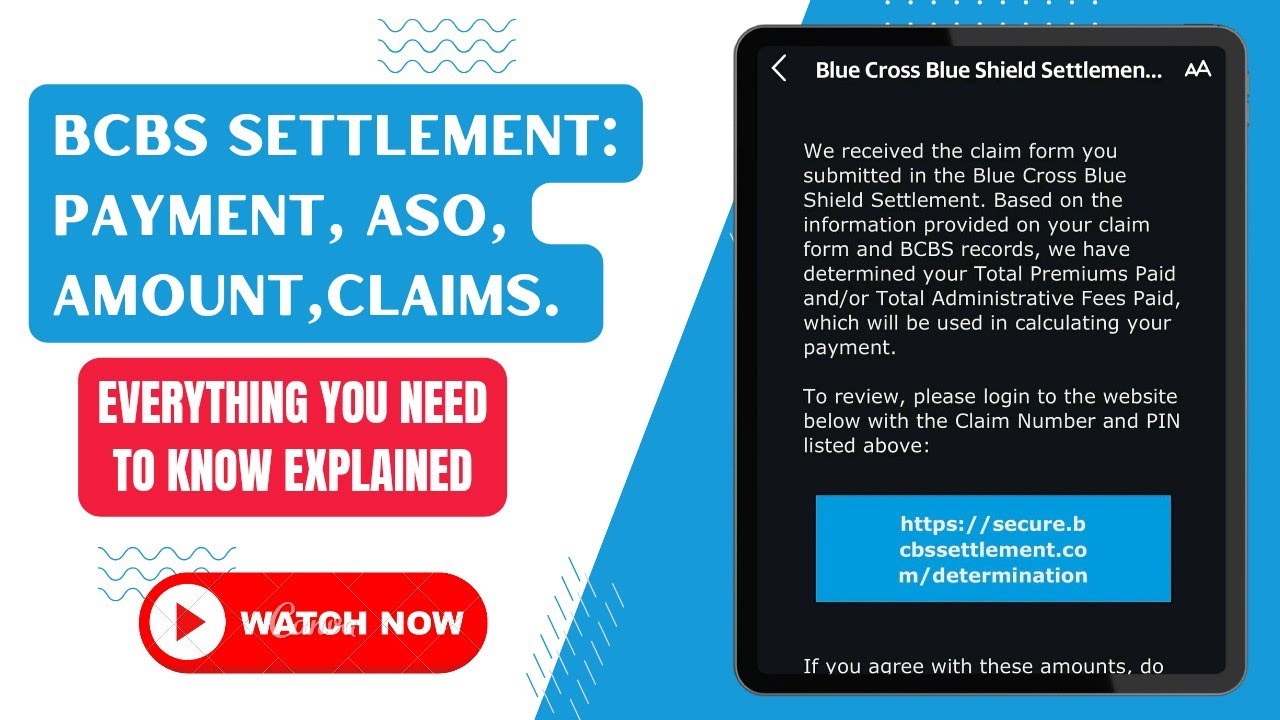
Navigating the BCBS Settlement: What You Need to Know About the Blue Cross Blue Shield Antitrust Lawsuit
The BCBS settlement, stemming from a significant antitrust lawsuit against Blue Cross Blue Shield (BCBS) companies, represents a landmark resolution impacting millions of healthcare consumers and providers across the United States. This lawsuit, alleging anticompetitive practices that limited competition and inflated prices, has resulted in a settlement agreement that aims to rectify these issues and provide substantial benefits to affected parties. Understanding the intricacies of the BCBS settlement is crucial for anyone who has been a BCBS member or healthcare provider.
This article delves into the details of the BCBS settlement, exploring its origins, key provisions, eligibility criteria, and potential impact on the healthcare landscape. We will break down the complex legal jargon and provide a clear, concise overview of what you need to know to navigate this significant development. Whether you are a policyholder, a healthcare professional, or simply interested in the evolving dynamics of the healthcare industry, this guide will equip you with the knowledge to understand and potentially benefit from the BCBS settlement.
The Origins of the BCBS Antitrust Lawsuit
The antitrust lawsuit that led to the BCBS settlement was filed several years ago, alleging that Blue Cross Blue Shield Association (BCBSA) and its member companies violated antitrust laws by engaging in practices that restricted competition. These practices included territorial restrictions that limited the ability of individual BCBS companies to compete outside their designated areas, as well as agreements that allegedly suppressed competition among BCBS plans. The plaintiffs in the lawsuit argued that these actions resulted in higher healthcare costs and reduced choices for consumers and providers.
The core allegation was that the BCBSA’s licensing agreement, which grants exclusive territories to its member companies, effectively created monopolies in those areas. This lack of competition, it was argued, allowed BCBS companies to charge higher premiums and negotiate less favorable rates with healthcare providers. The lawsuit sought to dismantle these anticompetitive practices and provide restitution to those who had been harmed.
Key Provisions of the BCBS Settlement Agreement
The settlement agreement reached in the BCBS settlement includes several key provisions designed to address the alleged anticompetitive practices and provide relief to affected parties. These provisions can be broadly categorized into injunctive relief and monetary relief.
Injunctive Relief
The injunctive relief component of the BCBS settlement aims to modify the business practices of BCBSA and its member companies to promote greater competition. This includes changes to the Blue Cross Blue Shield Association’s rules and regulations to allow for more competition among BCBS companies. Specifically, the settlement removes certain restrictions that prevented BCBS companies from competing with each other in different geographic areas. This change is intended to foster a more competitive marketplace, potentially leading to lower premiums and more diverse healthcare options for consumers.
- Increased Competition: BCBS companies will have greater freedom to compete outside their assigned territories.
- Transparency: The settlement mandates increased transparency in the BCBSA’s decision-making processes.
- New Market Entrants: The agreement encourages the entry of new players into the health insurance market.
Monetary Relief
The monetary relief component of the BCBS settlement involves the establishment of a settlement fund to compensate individuals and businesses who were harmed by the alleged anticompetitive practices. This fund is designed to provide direct financial benefits to those who paid inflated premiums or received less favorable healthcare rates as a result of the BCBSA’s actions. The total amount of the settlement fund is substantial, reflecting the widespread impact of the alleged antitrust violations.
The exact amount each claimant receives will depend on several factors, including the type of BCBS plan they had, the duration of their coverage, and the overall number of claims filed. The claims process is designed to be fair and equitable, ensuring that eligible individuals and businesses receive appropriate compensation for their losses. [See also: BCBS Claims Process Guide]
Who is Eligible for the BCBS Settlement?
Determining eligibility for the BCBS settlement is a crucial step for anyone who believes they may have been affected by the alleged anticompetitive practices. Generally, individuals and businesses who purchased or were covered by a Blue Cross Blue Shield health insurance plan during a specific period are eligible to file a claim. The eligibility period typically spans several years, reflecting the duration of the alleged antitrust violations.
Specific eligibility criteria may vary depending on the type of BCBS plan and the state in which it was purchased. It is essential to carefully review the settlement website or consult with legal counsel to determine whether you meet the eligibility requirements. Common eligible groups include:
- Individuals: Individuals who purchased individual or family BCBS health insurance plans.
- Businesses: Businesses that purchased BCBS health insurance plans for their employees.
- Self-Funded Plans: Some self-funded plans that contracted with BCBS for administrative services.
It’s important to note that certain entities, such as government entities and BCBS companies themselves, are typically excluded from participating in the settlement. Understanding the specific eligibility requirements is crucial for determining whether you are entitled to receive compensation from the BCBS settlement.
How to File a Claim in the BCBS Settlement
Filing a claim in the BCBS settlement involves several steps, including gathering necessary documentation, completing a claim form, and submitting it to the settlement administrator. The claim process is designed to be straightforward, but it is essential to follow the instructions carefully to ensure that your claim is processed correctly.
The first step is to gather all relevant documentation, such as policy documents, premium statements, and any other records that demonstrate your BCBS coverage during the eligibility period. You will then need to complete a claim form, which can typically be found on the settlement website or obtained from the settlement administrator. The claim form will require you to provide information about your BCBS plan, your contact details, and any other relevant information.
Once you have completed the claim form and gathered all necessary documentation, you will need to submit it to the settlement administrator by the specified deadline. It is crucial to adhere to the deadline, as late claims may not be processed. You can typically submit your claim online or by mail, depending on the instructions provided by the settlement administrator.
Potential Impact of the BCBS Settlement on the Healthcare Landscape
The BCBS settlement has the potential to significantly impact the healthcare landscape in the United States. The injunctive relief provisions, which aim to promote greater competition among BCBS companies, could lead to lower premiums, more diverse healthcare options, and improved access to care for consumers. The monetary relief component of the settlement will provide direct financial benefits to those who were harmed by the alleged anticompetitive practices, helping to offset the costs of inflated premiums and reduced healthcare choices.
The BCBS settlement could also have broader implications for the healthcare industry as a whole. By addressing anticompetitive practices and promoting greater competition, the settlement could serve as a model for other antitrust lawsuits and regulatory actions in the healthcare sector. This could lead to a more competitive and consumer-friendly healthcare market, with lower costs and improved quality of care.
Staying Informed About the BCBS Settlement
Staying informed about the BCBS settlement is essential for anyone who may be eligible for compensation or affected by the changes to BCBSA’s business practices. The settlement website is a valuable resource for information about the settlement, including eligibility criteria, claim forms, deadlines, and other important updates. [See also: Official BCBS Settlement Website]
You can also sign up for email updates or follow the settlement administrator on social media to receive timely notifications about the settlement. Additionally, it is advisable to consult with legal counsel or a healthcare expert to understand your rights and options under the settlement. By staying informed and taking appropriate action, you can ensure that you receive the benefits to which you are entitled and navigate the evolving healthcare landscape effectively. The BCBS settlement is a complex issue, and proactive engagement is key to understanding its implications.
The Future of BCBS and Healthcare Competition
The BCBS settlement marks a turning point in the ongoing debate about competition and consolidation in the healthcare industry. While the settlement addresses specific anticompetitive practices of the BCBSA and its member companies, it also raises broader questions about the role of antitrust enforcement in promoting a fair and competitive healthcare market. The changes implemented as part of the settlement will be closely monitored to assess their impact on premiums, healthcare access, and quality of care.
The outcome of the BCBS settlement could influence future antitrust lawsuits and regulatory actions in the healthcare sector. It may also encourage other healthcare providers and insurers to re-evaluate their business practices to ensure compliance with antitrust laws. Ultimately, the goal is to create a healthcare system that is both affordable and accessible for all Americans. The BCBS settlement is a step in that direction, but continued vigilance and proactive enforcement are needed to maintain a competitive and consumer-friendly healthcare market.
In conclusion, the BCBS settlement is a significant development with far-reaching implications for healthcare consumers, providers, and the industry as a whole. By understanding the details of the settlement, including its origins, key provisions, eligibility criteria, and potential impact, you can navigate this complex issue effectively and ensure that you receive the benefits to which you are entitled. The BCBS settlement represents a step towards a more competitive and consumer-friendly healthcare market, but continued vigilance and proactive engagement are essential to achieve lasting change. The BCBS settlement is more than just a legal agreement; it’s a potential catalyst for a more equitable healthcare system.

